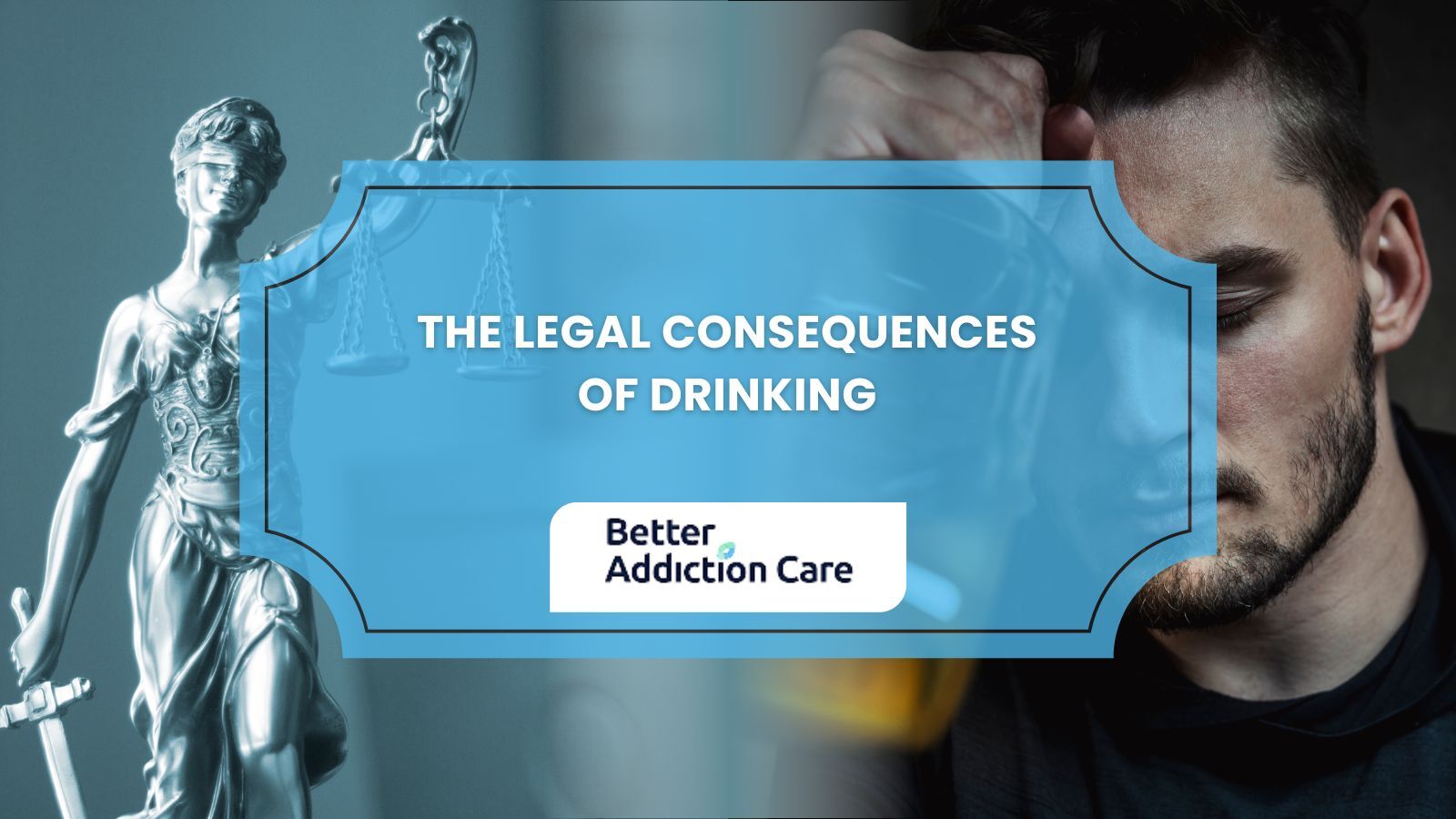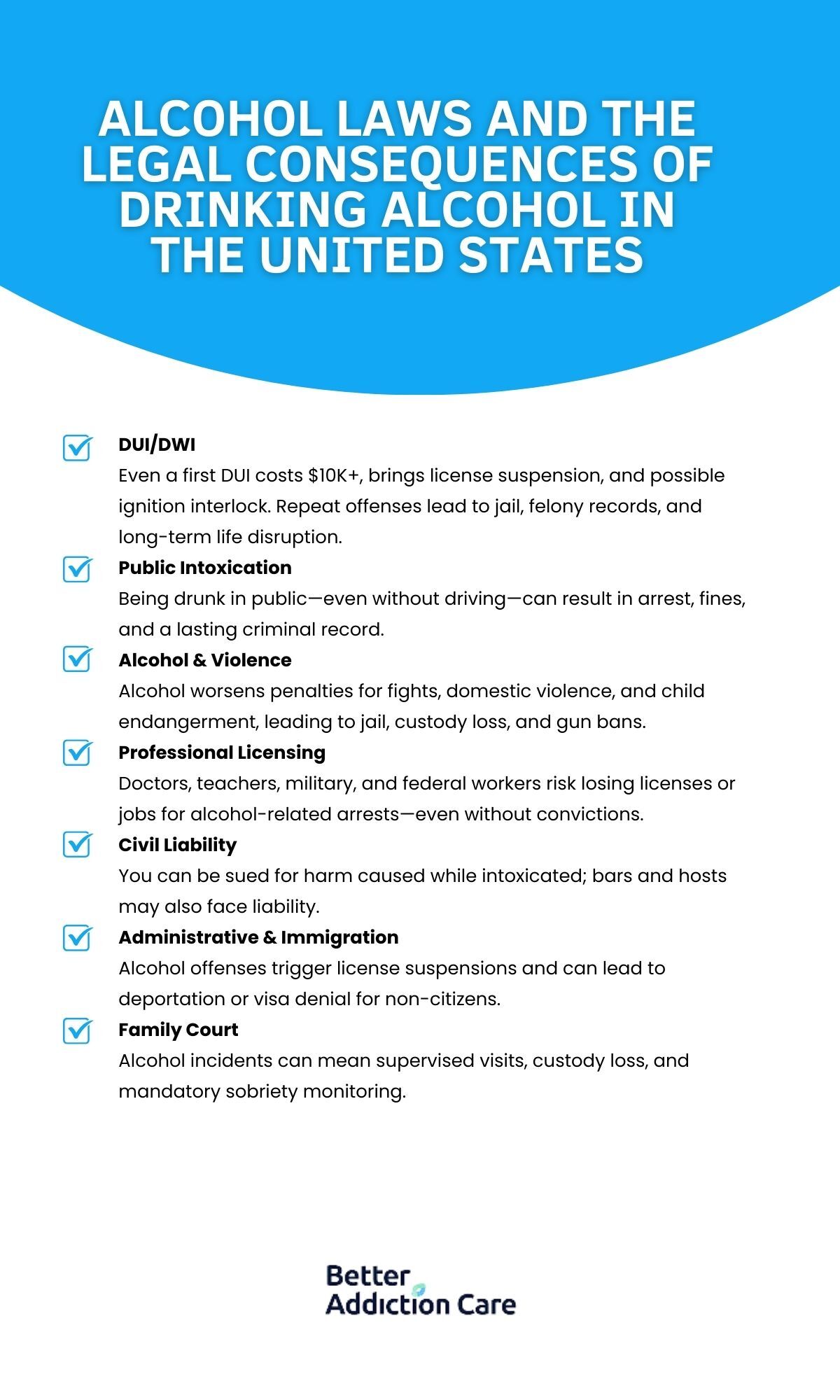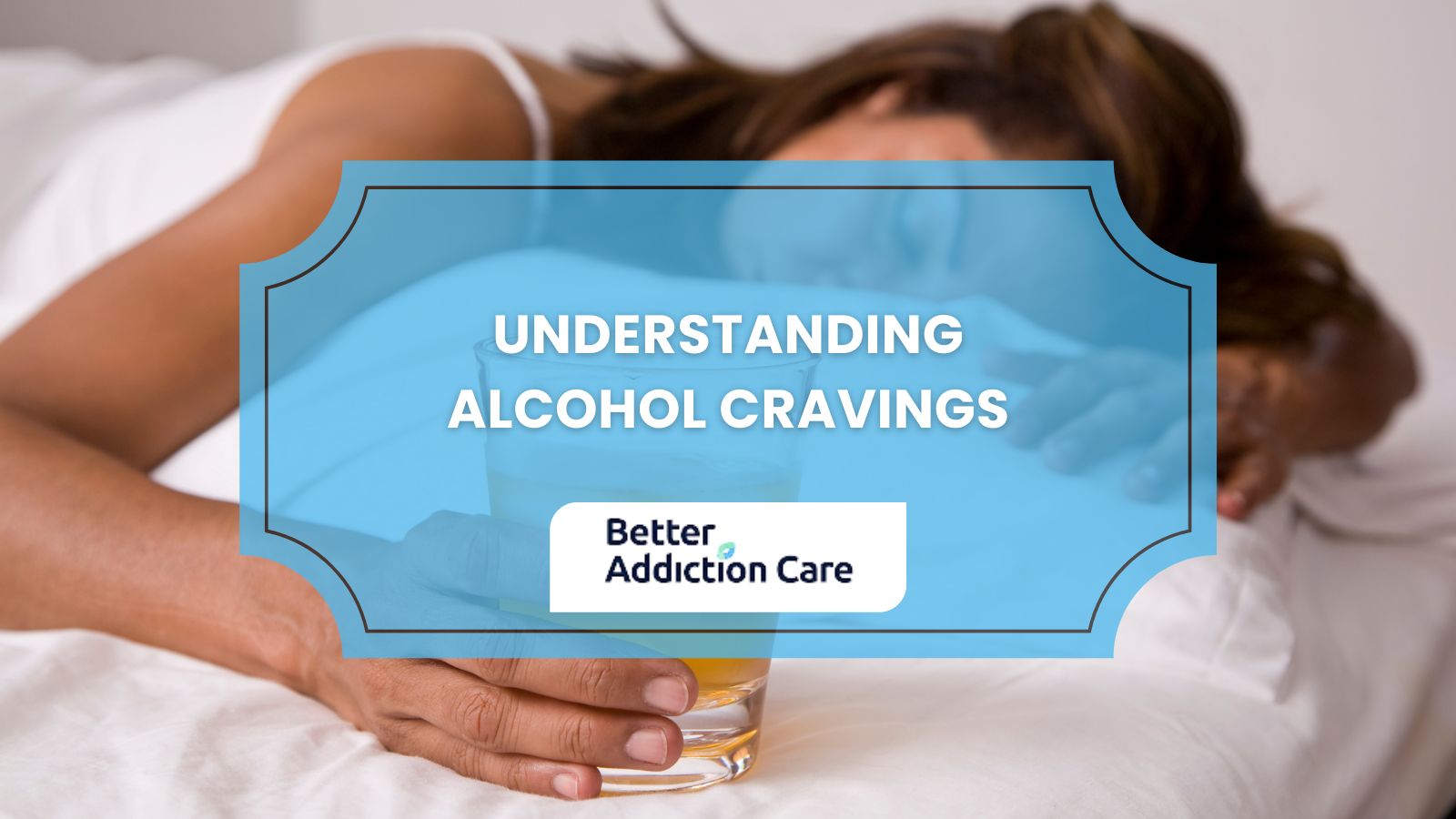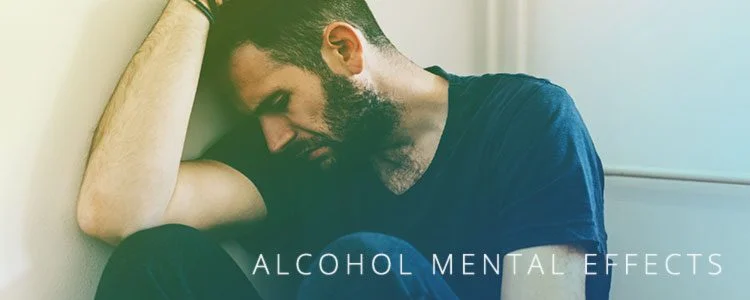The Legal Consequences of Drinking
The legal consequences of drinking encompass a range of punitive measures imposed by law when alcohol consumption leads to prohibited or unsafe behavior. These include criminal charges for drunk driving, with a blood alcohol concentration over 0.08% in most countries resulting in fines, imprisonment, or license revocation.

Underage drinking, illegal under age 18 or 21, depending on jurisdiction, carries penalties such as community service, academic sanctions, or criminal records. Alcohol is implicated in 40% of domestic violence cases and has been linked to nearly 8,462 homicides annually in the U.S., according to a CDC review from 2019.
Key Takeaways:
-
Alcohol-related offenses go far beyond DUIs, and the penalties are devastating: A single incident can trigger license suspension, jail time, $10,000+ in costs, and long-term consequences like job loss, loss of professional licenses, or even deportation. Repeat offenses escalate quickly to felonies and prison time.
-
You can get arrested even if you're not driving: Public intoxication, bar fights, and alcohol-fueled arguments can lead to misdemeanor or felony charges. Being drunk in the wrong place, even walking home, can leave you with a permanent criminal record that affects housing, employment, and custody rights.
-
Drinking puts your career, family, and future at risk: Professionals (nurses, teachers, pilots, etc.) may lose licenses after a single charge. Family courts may revoke custody or visitation. Immigration status, military service, and federal employment can be permanently affected, all from one night of bad judgment.
Public intoxication, disorderly conduct, and workplace infractions tied to alcohol may also result in arrests or termination. In the realm of family law, excessive drinking can influence child custody decisions or lead to supervised visitation.
A 2025 study by Amelia Sharp titled "What Are the Legal Consequences of Alcohol Abuse?" published by American Addiction Centers synthesizes these risks. This study shows how alcohol misuse not only harms health but also invokes legal liabilities across societal systems.
This article provides an educational overview of the legal consequences associated with alcohol consumption across United States.
Understanding these legal frameworks is essential for comprehending potential outcomes of alcohol-related incidents.
Below are the Alcohol laws and the legal consequences of drinking alcohol in the United States.

1. Criminal Law: Driving Under the Influence (DUI/DWI)
Driving under the influence constitutes a criminal offense in all U.S. jurisdictions, with blood alcohol concentration (BAC) limits set at 0.08% for adults and 0.02% for drivers under 21(1).
Legal consequences vary by state but generally follow escalating penalty structures.
First Offense Reality Check
Even your first DUI isn't just a slap on the wrist. Here's what you're facing:
Immediate License Suspension: Your license gets suspended the moment you're arrested - not when you're convicted. In most states, you have 10-15 days to request a hearing, or you lose automatically. Miss that deadline and you're walking for months.
Financial Devastation: That $800 fine is just the beginning. Add lawyer fees ($2,500-$5,000), court costs ($300-$500), license reinstatement fees ($125-$300), mandatory classes ($300-$500), and insurance increases that can cost you $3,000+ annually for three years. Total first-offense cost: $10,000-$15,000.
Ignition Interlock Devices: Forty-five states mandate ignition interlock devices for DUI offenders, with 28 states requiring them for first-time offenses (2). These court-ordered devices prevent vehicle operation if alcohol is detected. You pay $150 to install it, $80 per month to lease it, and calibration fees every 60 days. The device records everything; if you fail a test, it reports to the court immediately.
Employment Impact: You must inform your employer if driving is a part of your job. Commercial drivers lose their CDL for one year. Regular employees often get fired - not because it's legal, but because most companies have policies allowing termination for criminal charges.
Second Offense:
Many states upgrade a second DUI to a felony, which means:
-
Mandatory minimum jail time (often 30-90 days)
-
Felony conviction on your record forever
-
Loss of voting rights and gun ownership
-
Automatic job loss in many professions
-
Deportation risk if you're not a U.S. citizen
Third Offense: Prison Time
Three-time DUI offenders typically face 1-5 years in prison, not jail. Your life essentially stops while you serve time, lose your job, potentially lose your home, and come out to rebuild from nothing.
2. Alcohol-Related Public Order Offenses:
You don't need to be driving to get arrested for alcohol. Public intoxication statutes vary significantly across jurisdictions. Approximately 40 states maintain public intoxication as a criminal offense, while others treat it as a civil matter or health issue (3).
Public intoxication laws vary by state, but they can get you arrested for:
-
Being drunk in a bar (yes, really)
-
Walking home drunk from a party
-
Being loud or argumentative while intoxicated
-
Sleeping it off in your car (even if you weren't driving)
What This Costs You?
-
Arrest and booking (you're in jail until sober)
-
Criminal record for a misdemeanor
-
Fines of $200-$1,000
-
Community service requirements
-
Impact on professional licenses
The real problem isn't the penalty - it's that you now have a criminal record. Background checks will show this arrest forever in most states.
3. Alcohol and Violence:
Alcohol doesn't excuse violence - legally, it often makes things worse. Courts view drinking as an aggravating factor, not a defense.
Assault Charges: Getting in a bar fight while drunk doesn't get you sympathy from judges. Simple assault becomes aggravated assault if you use a weapon (including a bottle or glass). Aggravated assault is often a felony with 1-10 years in prison.
Domestic Violence: This is where alcohol ruins lives. A domestic violence conviction means:
-
Automatic restraining order (you can't go home)
-
Loss of gun rights for life under federal law
-
Mandatory anger management classes
-
Possible loss of child custody
-
Many employers automatically fire employees with DV convictions
Child Endangerment: If you're drunk around kids - even your own - you can face child endangerment charges. This can trigger:
-
CPS investigation and possible removal of children
-
Loss of custody rights
-
Placement on child abuse registries
-
Supervised visitation only
4. Professional and Occupational Licensing Consequences
Many professionals don't realize their licenses are at risk with any alcohol-related conviction.
Licensed Professionals at Risk:
-
Doctors, nurses, and medical professionals
-
Lawyers and judges
-
Teachers and school employees
-
Real estate agents
-
Accountants and financial advisors
-
Pilots and commercial drivers
-
Security guards and police officers
What Happens? Most licensing boards require you to report arrests within 30 days, not just convictions. Even if charges are dropped, the board can still discipline you. Penalties range from probation to permanent license revocation.
Military Personnel: Any alcohol-related incident can result in non-judicial punishment, reduction in rank, loss of security clearance, or discharge. A DUI as an officer often means the end of your military career.
Federal Employees: Security clearances get suspended or revoked for alcohol incidents. Without clearance, you lose your job. Federal security clearances face review following alcohol-related incidents. The Security Executive Agent Directive establishes guidelines for evaluating alcohol-related conduct in clearance determinations (4).
5. Civil Liability and Tort Law
Personal Liability
Individuals who cause harm while intoxicated face potential civil liability independent of criminal proceedings. Civil lawsuits operate under different legal standards and may proceed even when criminal charges are dismissed.
Negligence Claims: Plaintiffs must establish:
-
Duty of care owed to the injured party
-
Breach of that duty through intoxicated conduct
-
Causation linking the breach to the resulting harm
-
Actual damages requiring compensation
Dram Shop Liability
Forty-three states maintain dram shop laws holding commercial alcohol vendors liable for damages caused by intoxicated patrons under specific circumstances (5). These laws typically require proof that:
-
The establishment served alcohol to a visibly intoxicated person
-
The intoxication was a proximate cause of the resulting harm
-
Damages occurred to a third party
Social Host Liability
Some jurisdictions extend liability to private parties who provide alcohol at social gatherings. Social host laws vary significantly but may impose liability when:
-
Hosts provide alcohol to minors
-
Adult guests cause harm to third parties after consuming alcohol at the event
-
Hosts continue serving intoxicated guests
6. Administrative Consequences
Driver's License Actions
Motor vehicle departments maintain independent authority to suspend or revoke driving privileges based on alcohol-related convictions:
-
Point Systems: DUI convictions typically result in substantial point assessments against driving records
-
Habitual Offender Classifications: Multiple alcohol-related violations may result in extended license revocations
-
Restricted Licenses: Some states offer limited driving privileges for work, school, or treatment purposes
Immigration Consequences
Non-U.S. citizens face potential immigration consequences for alcohol-related convictions:
-
Deportability: Certain alcohol-related offenses may constitute grounds for removal proceedings
-
Inadmissibility: Convictions may affect eligibility for visa applications or citizenship proceedings
-
Discretionary Relief: Immigration judges may consider alcohol-related convictions in discretionary relief determinations
7. Family Court: How Alcohol Destroys Relationships?
Divorce and custody battles get vicious when alcohol is involved. Family courts have broad discretion to protect children, which means:
Supervised Visitation: Any alcohol-related incident can result in court-ordered supervision of your time with your children. You pay for supervision (often $50-$100 per visit).
Custody Loss: Courts prioritize child safety over parent rights. A pattern of alcohol incidents can result in the complete loss of custody.
Sobriety Monitoring: Courts can order continuous alcohol monitoring (SCRAM bracelets) that test your sobriety, testing your sweat for alcohol 24/7. You pay for installation, monitoring fees, and any violations trigger immediate consequences.
The Criminal Record That Never Goes Away
Most states don't allow DUI expungement. This means your conviction follows you forever:
Employment: Background checks will show your conviction. Many employers have blanket policies against hiring people with criminal records.
Housing: Landlords can deny rental applications based on criminal history. This is legal in most states.
Professional Licensing: Even decades later, licensing applications ask about criminal history. You'll be explaining your DUI for the rest of your career.
Volunteer Work: Many volunteer positions (coaching youth sports, school activities) require background checks. Criminal records can disqualify you from community involvement.
What Happens to Your Freedom?
People underestimate how much jail time they're facing:
Pretrial Detention: Can't make bail? You sit in jail until trial, which can take months. You lose your job, miss rent payments, and your life falls apart while you wait.
Probation Violations: Drink during probation, and you serve the original jail sentence plus additional time for the violation. Technical violations (missing appointments, positive tests) can send you back to jail immediately.
Ignition Interlock Violations: Failed tests, missed appointments, or tampering with the device triggers immediate consequences, including jail time and extended monitoring periods.
Federal Charges: When State Problems Become Federal Crimes?
Some alcohol incidents trigger federal charges:
Interstate Commerce: DUI involving commercial vehicles, accidents on federal property, or incidents involving federal employees can become federal cases with much harsher penalties.
Native American Reservations: DUI on reservation land often involves federal prosecution with different rules and penalties.
Federal Facilities: Alcohol incidents at airports, military bases, or federal buildings trigger federal charges that can't be expunged and carry mandatory minimums.
Expungement and Record Sealing
State Variations
Expungement availability for alcohol-related convictions varies significantly by jurisdiction:
-
Prohibited Expungement: Many states specifically exclude DUI convictions from expungement eligibility
-
Limited Relief: Some jurisdictions allow expungement only for first-time offenses after extended waiting periods
-
Conditional Sealing: Certain states offer record sealing with restrictions on access by specific entities
Practical Limitations
Even where expungement is available, some records may remain accessible to:
-
Law enforcement agencies
-
Professional licensing boards
-
Federal security clearance investigators
-
Immigration authorities
The Long-Term Reality
These aren't theoretical consequences - they happen to real people every day. The person who thinks they're just having a few drinks and driving home doesn't realize they're potentially jeopardizing their career, family, and future.
The legal system doesn't care that you're normally responsible, that you have a family to support, or that this was a one-time mistake. Once you're in the system, the consequences follow their logic, and they're designed to be severe enough to deter others.
Your best defense against these consequences isn't a good lawyer after you're arrested - it's never putting yourself in a position to face them in the first place. Every drink you take before getting behind the wheel, every time you get belligerent in public while intoxicated, every argument you have while drunk is a roll of the dice with your entire future.
The stakes are higher than you think, and the house always wins.
FAQs:
1. What should we do immediately after a DUI arrest?
Request a DMV hearing quickly (usually within 30 days) and contact a DUI lawyer. Gather court papers, secure transportation, and begin alcohol treatment if possible; courts see this as a sign of responsibility.
2. Will a DUI affect child custody?
Yes. A DUI, especially with children involved, can lead to supervised visitation or custody loss. Courts focus on the child’s safety and may involve Child Protective Services.
3. Can a first-time DUI be expunged or dismissed?
Sometimes. Many states offer diversion programs or allow record sealing after a clean period. Check with a lawyer about eligibility.
4. How bad is SR-22 insurance?
It’s mandatory after a DUI in most states and very expensive, often double or triple your previous rates, lasting 3–5 years.
5. Will a DUI hurt my job or license?
It can. Jobs involving driving or state licensing (nursing, law, education, etc.) are at the highest risk. Employers may fire or decline to hire based on a DUI record.
6. How can families support someone facing DUI or alcohol charges?
Help them stay organized (court dates, paperwork), support rehab or counseling efforts, and document everything. Family involvement can improve legal outcomes and recovery.
Underage drinking, illegal under age 18 or 21, depending on jurisdiction, carries penalties such as community service, academic sanctions, or criminal records. Alcohol is implicated in 40% of domestic violence cases and has been linked to nearly 8,462 homicides annually in the U.S., according to a CDC review from 2019.
Key Takeaways:
-
Alcohol-related offenses go far beyond DUIs, and the penalties are devastating: A single incident can trigger license suspension, jail time, $10,000+ in costs, and long-term consequences like job loss, loss of professional licenses, or even deportation. Repeat offenses escalate quickly to felonies and prison time.
-
You can get arrested even if you're not driving: Public intoxication, bar fights, and alcohol-fueled arguments can lead to misdemeanor or felony charges. Being drunk in the wrong place, even walking home, can leave you with a permanent criminal record that affects housing, employment, and custody rights.
-
Drinking puts your career, family, and future at risk: Professionals (nurses, teachers, pilots, etc.) may lose licenses after a single charge. Family courts may revoke custody or visitation. Immigration status, military service, and federal employment can be permanently affected, all from one night of bad judgment.
Public intoxication, disorderly conduct, and workplace infractions tied to alcohol may also result in arrests or termination. In the realm of family law, excessive drinking can influence child custody decisions or lead to supervised visitation.
A 2025 study by Amelia Sharp titled "What Are the Legal Consequences of Alcohol Abuse?" published by American Addiction Centers synthesizes these risks. This study shows how alcohol misuse not only harms health but also invokes legal liabilities across societal systems.
This article provides an educational overview of the legal consequences associated with alcohol consumption across United States.
Understanding these legal frameworks is essential for comprehending potential outcomes of alcohol-related incidents.
Below are the Alcohol laws and the legal consequences of drinking alcohol in the United States.

1. Criminal Law: Driving Under the Influence (DUI/DWI)
Driving under the influence constitutes a criminal offense in all U.S. jurisdictions, with blood alcohol concentration (BAC) limits set at 0.08% for adults and 0.02% for drivers under 21(1).
Legal consequences vary by state but generally follow escalating penalty structures.
First Offense Reality Check
Even your first DUI isn't just a slap on the wrist. Here's what you're facing:
Immediate License Suspension: Your license gets suspended the moment you're arrested - not when you're convicted. In most states, you have 10-15 days to request a hearing, or you lose automatically. Miss that deadline and you're walking for months.
Financial Devastation: That $800 fine is just the beginning. Add lawyer fees ($2,500-$5,000), court costs ($300-$500), license reinstatement fees ($125-$300), mandatory classes ($300-$500), and insurance increases that can cost you $3,000+ annually for three years. Total first-offense cost: $10,000-$15,000.
Ignition Interlock Devices: Forty-five states mandate ignition interlock devices for DUI offenders, with 28 states requiring them for first-time offenses (2). These court-ordered devices prevent vehicle operation if alcohol is detected. You pay $150 to install it, $80 per month to lease it, and calibration fees every 60 days. The device records everything; if you fail a test, it reports to the court immediately.
Employment Impact: You must inform your employer if driving is a part of your job. Commercial drivers lose their CDL for one year. Regular employees often get fired - not because it's legal, but because most companies have policies allowing termination for criminal charges.
Second Offense:
Many states upgrade a second DUI to a felony, which means:
-
Mandatory minimum jail time (often 30-90 days)
-
Felony conviction on your record forever
-
Loss of voting rights and gun ownership
-
Automatic job loss in many professions
-
Deportation risk if you're not a U.S. citizen
Third Offense: Prison Time
Three-time DUI offenders typically face 1-5 years in prison, not jail. Your life essentially stops while you serve time, lose your job, potentially lose your home, and come out to rebuild from nothing.
2. Alcohol-Related Public Order Offenses:
You don't need to be driving to get arrested for alcohol. Public intoxication statutes vary significantly across jurisdictions. Approximately 40 states maintain public intoxication as a criminal offense, while others treat it as a civil matter or health issue (3).
Public intoxication laws vary by state, but they can get you arrested for:
-
Being drunk in a bar (yes, really)
-
Walking home drunk from a party
-
Being loud or argumentative while intoxicated
-
Sleeping it off in your car (even if you weren't driving)
What This Costs You?
-
Arrest and booking (you're in jail until sober)
-
Criminal record for a misdemeanor
-
Fines of $200-$1,000
-
Community service requirements
-
Impact on professional licenses
The real problem isn't the penalty - it's that you now have a criminal record. Background checks will show this arrest forever in most states.
3. Alcohol and Violence:
Alcohol doesn't excuse violence - legally, it often makes things worse. Courts view drinking as an aggravating factor, not a defense.
Assault Charges: Getting in a bar fight while drunk doesn't get you sympathy from judges. Simple assault becomes aggravated assault if you use a weapon (including a bottle or glass). Aggravated assault is often a felony with 1-10 years in prison.
Domestic Violence: This is where alcohol ruins lives. A domestic violence conviction means:
-
Automatic restraining order (you can't go home)
-
Loss of gun rights for life under federal law
-
Mandatory anger management classes
-
Possible loss of child custody
-
Many employers automatically fire employees with DV convictions
Child Endangerment: If you're drunk around kids - even your own - you can face child endangerment charges. This can trigger:
-
CPS investigation and possible removal of children
-
Loss of custody rights
-
Placement on child abuse registries
-
Supervised visitation only
4. Professional and Occupational Licensing Consequences
Many professionals don't realize their licenses are at risk with any alcohol-related conviction.
Licensed Professionals at Risk:
-
Doctors, nurses, and medical professionals
-
Lawyers and judges
-
Teachers and school employees
-
Real estate agents
-
Accountants and financial advisors
-
Pilots and commercial drivers
-
Security guards and police officers
What Happens? Most licensing boards require you to report arrests within 30 days, not just convictions. Even if charges are dropped, the board can still discipline you. Penalties range from probation to permanent license revocation.
Military Personnel: Any alcohol-related incident can result in non-judicial punishment, reduction in rank, loss of security clearance, or discharge. A DUI as an officer often means the end of your military career.
Federal Employees: Security clearances get suspended or revoked for alcohol incidents. Without clearance, you lose your job. Federal security clearances face review following alcohol-related incidents. The Security Executive Agent Directive establishes guidelines for evaluating alcohol-related conduct in clearance determinations (4).
5. Civil Liability and Tort Law
Personal Liability
Individuals who cause harm while intoxicated face potential civil liability independent of criminal proceedings. Civil lawsuits operate under different legal standards and may proceed even when criminal charges are dismissed.
Negligence Claims: Plaintiffs must establish:
-
Duty of care owed to the injured party
-
Breach of that duty through intoxicated conduct
-
Causation linking the breach to the resulting harm
-
Actual damages requiring compensation
Dram Shop Liability
Forty-three states maintain dram shop laws holding commercial alcohol vendors liable for damages caused by intoxicated patrons under specific circumstances (5). These laws typically require proof that:
-
The establishment served alcohol to a visibly intoxicated person
-
The intoxication was a proximate cause of the resulting harm
-
Damages occurred to a third party
Social Host Liability
Some jurisdictions extend liability to private parties who provide alcohol at social gatherings. Social host laws vary significantly but may impose liability when:
-
Hosts provide alcohol to minors
-
Adult guests cause harm to third parties after consuming alcohol at the event
-
Hosts continue serving intoxicated guests
6. Administrative Consequences
Driver's License Actions
Motor vehicle departments maintain independent authority to suspend or revoke driving privileges based on alcohol-related convictions:
-
Point Systems: DUI convictions typically result in substantial point assessments against driving records
-
Habitual Offender Classifications: Multiple alcohol-related violations may result in extended license revocations
-
Restricted Licenses: Some states offer limited driving privileges for work, school, or treatment purposes
Immigration Consequences
Non-U.S. citizens face potential immigration consequences for alcohol-related convictions:
-
Deportability: Certain alcohol-related offenses may constitute grounds for removal proceedings
-
Inadmissibility: Convictions may affect eligibility for visa applications or citizenship proceedings
-
Discretionary Relief: Immigration judges may consider alcohol-related convictions in discretionary relief determinations
7. Family Court: How Alcohol Destroys Relationships?
Divorce and custody battles get vicious when alcohol is involved. Family courts have broad discretion to protect children, which means:
Supervised Visitation: Any alcohol-related incident can result in court-ordered supervision of your time with your children. You pay for supervision (often $50-$100 per visit).
Custody Loss: Courts prioritize child safety over parent rights. A pattern of alcohol incidents can result in the complete loss of custody.
Sobriety Monitoring: Courts can order continuous alcohol monitoring (SCRAM bracelets) that test your sobriety, testing your sweat for alcohol 24/7. You pay for installation, monitoring fees, and any violations trigger immediate consequences.
The Criminal Record That Never Goes Away
Most states don't allow DUI expungement. This means your conviction follows you forever:
Employment: Background checks will show your conviction. Many employers have blanket policies against hiring people with criminal records.
Housing: Landlords can deny rental applications based on criminal history. This is legal in most states.
Professional Licensing: Even decades later, licensing applications ask about criminal history. You'll be explaining your DUI for the rest of your career.
Volunteer Work: Many volunteer positions (coaching youth sports, school activities) require background checks. Criminal records can disqualify you from community involvement.
What Happens to Your Freedom?
People underestimate how much jail time they're facing:
Pretrial Detention: Can't make bail? You sit in jail until trial, which can take months. You lose your job, miss rent payments, and your life falls apart while you wait.
Probation Violations: Drink during probation, and you serve the original jail sentence plus additional time for the violation. Technical violations (missing appointments, positive tests) can send you back to jail immediately.
Ignition Interlock Violations: Failed tests, missed appointments, or tampering with the device triggers immediate consequences, including jail time and extended monitoring periods.
Federal Charges: When State Problems Become Federal Crimes?
Some alcohol incidents trigger federal charges:
Interstate Commerce: DUI involving commercial vehicles, accidents on federal property, or incidents involving federal employees can become federal cases with much harsher penalties.
Native American Reservations: DUI on reservation land often involves federal prosecution with different rules and penalties.
Federal Facilities: Alcohol incidents at airports, military bases, or federal buildings trigger federal charges that can't be expunged and carry mandatory minimums.
Expungement and Record Sealing
State Variations
Expungement availability for alcohol-related convictions varies significantly by jurisdiction:
-
Prohibited Expungement: Many states specifically exclude DUI convictions from expungement eligibility
-
Limited Relief: Some jurisdictions allow expungement only for first-time offenses after extended waiting periods
-
Conditional Sealing: Certain states offer record sealing with restrictions on access by specific entities
Practical Limitations
Even where expungement is available, some records may remain accessible to:
-
Law enforcement agencies
-
Professional licensing boards
-
Federal security clearance investigators
-
Immigration authorities
The Long-Term Reality
These aren't theoretical consequences - they happen to real people every day. The person who thinks they're just having a few drinks and driving home doesn't realize they're potentially jeopardizing their career, family, and future.
The legal system doesn't care that you're normally responsible, that you have a family to support, or that this was a one-time mistake. Once you're in the system, the consequences follow their logic, and they're designed to be severe enough to deter others.
Your best defense against these consequences isn't a good lawyer after you're arrested - it's never putting yourself in a position to face them in the first place. Every drink you take before getting behind the wheel, every time you get belligerent in public while intoxicated, every argument you have while drunk is a roll of the dice with your entire future.
The stakes are higher than you think, and the house always wins.
FAQs:
1. What should we do immediately after a DUI arrest?
Request a DMV hearing quickly (usually within 30 days) and contact a DUI lawyer. Gather court papers, secure transportation, and begin alcohol treatment if possible; courts see this as a sign of responsibility.
2. Will a DUI affect child custody?
Yes. A DUI, especially with children involved, can lead to supervised visitation or custody loss. Courts focus on the child’s safety and may involve Child Protective Services.
3. Can a first-time DUI be expunged or dismissed?
Sometimes. Many states offer diversion programs or allow record sealing after a clean period. Check with a lawyer about eligibility.
4. How bad is SR-22 insurance?
It’s mandatory after a DUI in most states and very expensive, often double or triple your previous rates, lasting 3–5 years.
5. Will a DUI hurt my job or license?
It can. Jobs involving driving or state licensing (nursing, law, education, etc.) are at the highest risk. Employers may fire or decline to hire based on a DUI record.
6. How can families support someone facing DUI or alcohol charges?
Help them stay organized (court dates, paperwork), support rehab or counseling efforts, and document everything. Family involvement can improve legal outcomes and recovery.
Resources
Related Articles
Treatment Centers in Oregon










